
“In its commitment to the Planet,
NH ROOM4 PLANET
NH Hotel Group is a company committed to the wellbeing of its guests and to efficient management of the available resources in the environment where the Group’s hotels are located. The Company is aware of the effects of its activity on the environment, and works to prevent and anticipate possible environmental contingencies, as well as to integrate sustainability in all its processes, striving to reduce its impacts.
The Company’s environmentval management is channelled through NH ROOM4 Planet, which defines the roadmap to fulfil the commitment undertaken in the battle against climate change and progress towards decarbonization, efficient management and responsible consumption of resources and circular economy, the development of more sustainable products but also involving employees, suppliers, partners and customers as key players in achieving these goals.
These commitments, applicable to all NH Hotel Group’s operations and to the Company’s decision-making process, are formalized in the Environment and Energy Policy. It includes both the supply chain and distribution, the inclusion of new partners or addition of hotels to the portfolio and the operation of hotels under ownership, lease, management and franchise to comply both with this Policy, to voluntary subscriptions adopted by NH, or to applicable environmental law and regulations.
To manage the environmental strategy, NH Hotel Group has a Sustainable Business Corporate Department which reports to the Chief People & Sustainable Business. Furthermore, with the aim of preventing and reducing environmental risks and impacts, and of implementing the Company’s commitments in this regard, work is coordinated between teams from different areas, both at corporate level and at business unit and hotel level.
In addition, in the last quarter of the year, the online course on environmental awareness was relaunched to training employees in environmental aspects and provide them with the skills to incorporate in their daily routines and tasks and participate in this way in the achievement of the Company’s commitments. The target of this training was extended to all the employees of the Organization and it was made compulsory. Since the launch of the training, 2,997 hours have been completed.
The Company’s environmental management is based on the identification and annual review of the main environmental impacts it could cause through the environmental risk map. Although there is a specific process to assess environmental risks, the methodology followed is consistent with the corporate risk management model. In 2021, the risks that have been identified as the most significant are:
- The Company’s preparedness to comply with climate regulation in the different regions.
- The need to implement new technologies to operate in a low-carbon economy.
- The consequences of European legislation on single-use plastics.
Atmospheric pollution, including noise and light pollution, the consumption of raw materials and the protection of biodiversity were not significant in our activity after this analysis.
The updated environmental risk map is reviewed and validated by the Risk Management Team, which adds the risks identified as most critical to the Company’s risk catalogue. The environmental risk map is also submitted to the Executive Risk Committee for validation and approval. (More information on the functions of the Executive Risk Committee in the section “Risk Management Governance”).
In relation to provisions and guarantees to cover environmental risks, it should be noted that NH Hotel Group makes investments in environmental activities that are valued at cost of acquisition and capitalized as a higher cost of property, plant and equipment or inventories in the year they are incurred.
Expenses derived from the protection and improvement of the environment are recorded in the income statement in the year in which they incur, independently of when the associated monetary or financial flow takes place.
Provisions relating to likely or certain liabilities, ongoing litigation and ongoing damage compensation or obligations relating to the environment, the amount of which has not been determined, not covered by the Company’s insurance policies, are recorded at the start of the liability or obligation that determines a possible compensation or payment.
During 2021 NH Hotel Group has not received any significant fines for environmental non-compliance from the competent authorities in each region where it operates.
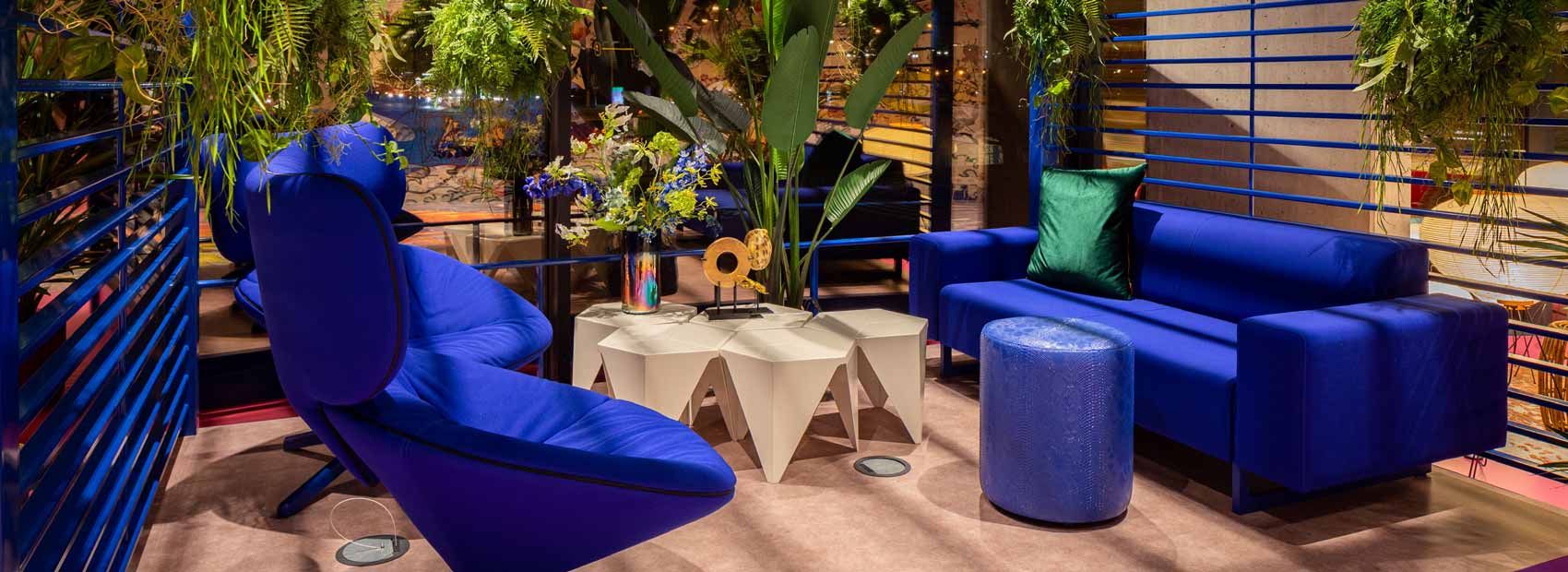
ENVIRONMENTAL CERTIFICATION PROGRAMME
NH Hotel Group’s hotels are certified under the ISO 14001 environmental management system and ISO 50001 energy efficiency system for accommodation services, restaurants, meetings and events. At the end of 2021, 47.3% of the hotels in Germany, Spain and Italy have ISO 14001 certification -a total of 96 hotels- and/or ISO 50001 -30 hotels-.
In addition to the ISO certification, some of the Group’s hotels also have other environmental certifications such as: BREEAM, LEED, Green Key, Hoteles+Verdes. The goal is to have an increasingly significant volume of hotels with globally recognized environmental certification, specific to the tourist sector, and approved by the Global Sustainable Tourism Council, the leading body.
In 2021, 3 hotels obtained a sustainability recognition for the first time, giving a total of 161 certified hotels* out of the 347 hotels in the portfolio.
“46% of the Group’s hotels boast individual environmental certifications”
* Some NH Hotel Group hotels have several certifications, so the final figures correspond only to the number of hotels. The scope is all hotels in the portfolio.
Environmental certification at the end of 2021
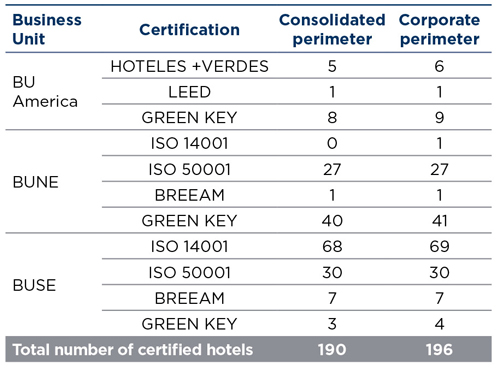
New hotels added to the certification programme in 2021

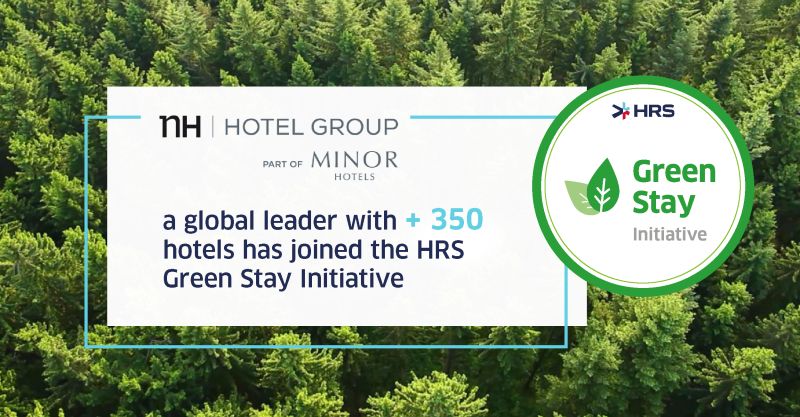
RECOGNITIONS AND ALLIANCES TO FAVOR ENVIRONMENTAL MANAGEMENT
As a sign of our environmental commitment, 163 hotels in the portfolio have obtained TripAdvisor’s Green Leaders awards, with a total of 46% of the Company’s hotels holding this recognition.
During the year, 294 of the Company’s hotels also obtained Booking’s environmental badge and the entire portfolio is part of the HRS Green Stay initiative.
In September 2021, NH Hotel Group signed an alliance with Bioscore to rate independently the behaviour of all the hotels in the portfolio on the basis of six pillars (emissions, energy, water, waste, restoration and social responsibility).

COMMITMENT TO THE FIGHT AGAINST CLIMATE CHANGE AND ADVANCING TOWARDS DECARBONIZATION
At NH Hotel Group, the fight against climate change is a fundamental strategic value, and with the aim of advancing in the definition of its climate strategy, an analysis was carried out during the year to determine how the Company is doing with respect to the recommendations of the TCFD (Task Force on Climate-related Financial Disclosures) and what steps should be taken to be aligned with it in 2023.
The Board of Directors of NH Hotel Group is responsible for supervising the NH ROOM4 Sustainable Business model, defined as one of the pillars of the Company’s strategy.
This supervision and control task is articulated through two of the Committees of the Board of Directors. On one hand, the Nominations, Remuneration and Corporate Governance Committee is responsible for monitoring and overseeing compliance with the model and NH Hotel Group’s Social and Environmental Policy. On the other hand, the Audit and Control Committee is responsible for assessing any matter relating to risks, which includes environmental and climate risks.
The Chief People and Sustainable Business Officer and the Chief Operations Officer are responsible for environmental and climate impacts in the Management Committee and validate the Company’s climate strategy set out in the NH ROOM4 Sustainable Business model. This coordinated function received a new boost on October 2nd, 2020 when the Chief Operations Officer was appointed as an executive member of the Board of Directors.
A working group has also been created with members from the areas of Operations, Procurement, Commercial, Assets, Building, Engineering and Maintenance, and Sustainability. This WG is meant to draw up and implement the “2030 SBT Commitment Plan” and report on its progress to the Chief People and Sustainable Business Officer and the Chief Operations Officer.
In 2019 the Company became the first Spanish hotel company to establish emission reduction targets that have been scientifically validated by the Science Based Targets initiative (SBTi) – the leading alliance and driving force in the business sector against climate change with the participation of CDP, the UN Global Compact, World Resources Institute and Worldwide Fund for Nature.
In doing so, NH Hotel Group formalises its commitment to reduce its carbon emissions throughout its value chain by 20% by 2030, thus avoiding the emission of more than 70,000 metric tons of CO2 into the atmosphere. Setting this target marks out NH Hotel Group’s roadmap towards a significant reduction in the carbon footprint of its activity in the coming years, aligned with the goal set out in the Paris Agreement to limit the increase in global temperature to less than 2ºC, and join the efforts being made globally towards the transition to a low-carbon economy.
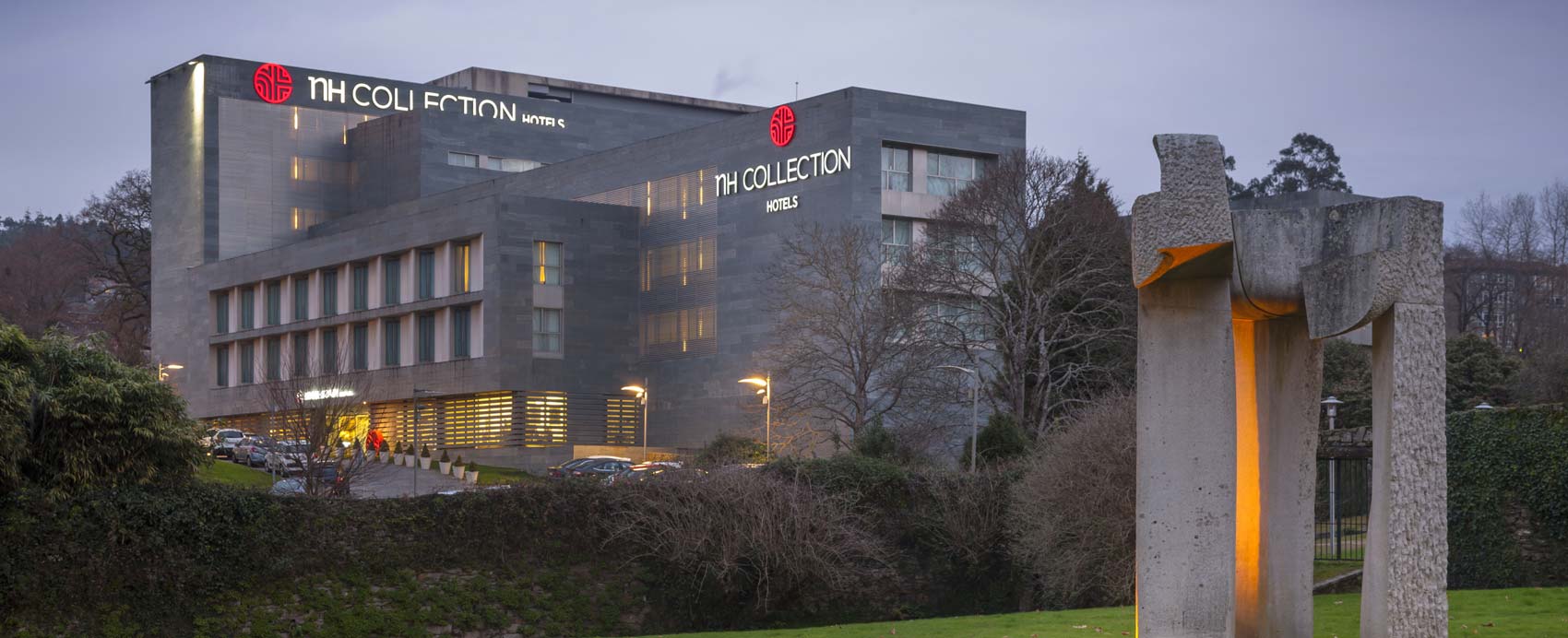
Climate risks and opportunities
Since 2019, NH Hotel Group has managed the risks deriving from Climate Change as part of the risk management model, after identifying Climate Change as one of the emerging risks for the Company.
At the same time, the climate risks the Company is exposed to are analyzed annually as part of the process of updating the environmental risk map, following the methodology in line with the corporate risk management model (see Risk Management chapter).
In the most recent update of the environmental risk map 2021, submitted to the Executive Risk Committee for validation, the most significant risks deriving from climate change identified were the Company’s preparedness to comply with climate regulation in the different regions, the need to implement new technologies to operate in a low-carbon economy and the consequences of European regulation of single-use plastics.
This regulatory environment towards a modern economy, efficient in the use of resources and competitive and carbon-neutral will have an impact for NH Hotel Group both in terms of investments and in renovation of hotels or acquisition of new hotels. It should be borne in mind that 84% of the portfolio is in European cities.
The change in weather patterns also has a direct effect on heating and cooling systems, producing additional costs related to the operation and maintenance of buildings, as well as other costs such as insulation, the ceiling and maintenance of building exteriors.
Finally, as the Company has been forced to reduce investments in the last two years to ensure business continuity, the incorporation of new technologies that will allow us to move towards a low-carbon operating model has slowed down. In the coming years, in order to direct the operation towards this model, we will return to our commitment to prioritise investments that contribute to this transformation.
The constant analysis of the climate risks we may be exposed to enables us to be alert so that we can turn them into an opportunity for the Company. We have managed to optimize operational processes and obtain savings thanks to reduction in energy and water consumption, totaling more than 31 million euros since 2008. In addition to this good performance in terms of efficiency, the Company’s climate commitments and the visibility given to all this have enabled NH Hotel Group to position itself as a sustainable business that respects the environment, thus increasing the value of its brands.
As a result of the analysis of the Company’s alignment to the recommendations of the TCFD, throughout 2022 an exercise will be carried out to improve the current methodology for identifying exposure to physical and transitional risks and opportunities associated to Climate Change, which will include a greater level of detail of such risks, as well as medium and long-term time horizons.
Mitigation and adaptation measures
NH Hotel Group’s efforts to combat climate change are part of the “2030 SBT Commitment Plan” which sets out the levers of action to comply with the goal of reducing its carbon emissions by 20% throughout the value chain by 2030.

Control and monitoring – the level on which work is being done to improve data capture and analysis, both from the activities of the hotels and of their suppliers and seek an alignment of commitments to reduce emissions in the value chain.

Energy efficiency – considers all actions that can improve efficiency in the hotel’s energy consumption.

Green energy considering both the installation of renewable energy for own consumption and the purchase of green electricity.
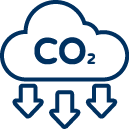
Emission offset strategy, with a twofold objective. On one hand, to use offset as an exceptional alternative in order to comply with the annual targets set and on the other hand give visibility to the Company’s climate commitment by involving guests in it.

Carbon analysis in development projects to anticipate the needs of adaptation of new properties to the climate goal so that it is not compromised.
The Company also has a corporate guideline “Eco-Efficient Hotel Guide” to integrate sustainability and energy efficiency in the design and construction of new hotels and in renovation. This guide assures that all the activities of its buildings will take environmental guidelines and the risks of climate change into account in design and construction in order to minimize and control risks.
Carbon footprint
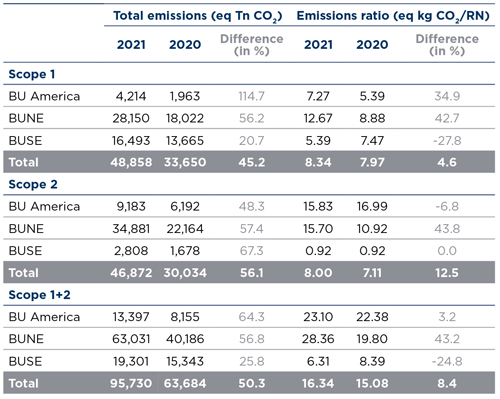
As most hotels have remained open throughout 2021, total emissions have increased considerably in all Business Units. However, although occupancy has also increased compared to the previous year, the increase has not been significant enough to be reflected in a decrease in the ratios, as many hotels have remained operational but with very low occupancies, especially in the Northern Europe Business Unit. This recovery in demand has only had an impact on the ratio in the Southern Europe Business Unit where it has materialised with a decrease in the ratio.
Following validation of the emission reduction targets by SBTs, NH Hotel Group has estimated following this methodology, a total Scope 3 emissions of 188,490 teq CO2* in 2021.
The Company also participates in different forums and projects to promote the fight against climate change and the reduction of carbon emissions and consumption.
* Published scope 3 emissions do not fall within the scope of the audit.
EFFICIENT MANAGEMENT AND RESPONSIBLE CONSUMPTION OF RESOURCES

GREEN SAVINGS PROJECT
A project focused both on obtaining savings in the Company’s operating costs, as well as in energy efficiency, to ensure savings in resources: water, energy and other expenses.
To keep exhaustive and rigorous control of the energy consumption, carbon footprint and water consumption measures, NH Hotel Group uses the Sustain Focus platform, from which the sustainability strategy indicators are monitored. This is an online system to which almost all the Company’s hotels have access that permits reporting, control, monitoring and traceability of the indicators and of water and energy consumption and costs.
Energy efficiency plan
This plan groups together “energy efficiency” projects, considering all those that can improve energy consumption in the hotels, as well as the associated costs:
• Changes in equipment, where the replacement involves greater efficiency: light bulbs, minibars, washing equipment, heating and air-conditioning, boilers, coolers…
• Investments related to control of installations: building energy management systems, update of meters, improvements in lighting…
• Actions on building façades that represent improvements in the envelope and in insulation.
• Additionally, in 2019 the Company created a new CapEx line aimed at projects where not only the economic return is sought, but also the environmental return. Some of these projects are the elimination of fossil fuels and the increase of renewable energy.
During 2021, projects that improve energy efficiency have been implemented, worth 1.58 million euros.
Energy consumption by source (kwh)
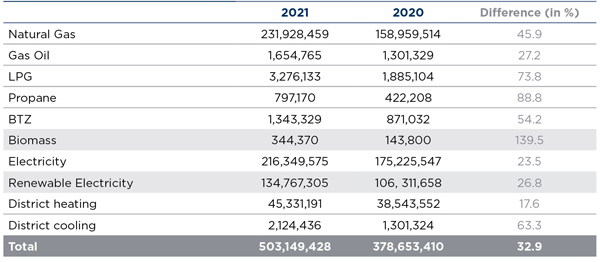
Energy Consumption

As most hotels have remained open for most of 2021, energy consumption has increased in all Business Units.
The increase in the ratio of the Northern Europe Business Unit compared to the rest of the Business Units was due to the drastic decrease in hotel activity in the third quarter of 2021 (hotels remained open in some locations) and therefore maintained their operations with very low occupancy, which contributed to the increase in the ratio. Furthermore, analysing the degree days recorded, it can be seen that 2021 has been a year of greater climatic demands than the previous year, especially in the heating season and, although the increase is generalised in all Business Units, in Northern Europe it is more pronounced in the cold season, which has also contributed to the increase in the ratio.
Alliance with Abastible
The NH Antofagasta and NH Iquique hotels joined Abastible to design a comprehensive energy solution with sustainable added value. Abastible is a local Chilean company that provides clean and environmentally friendly energy. The project provides for the generation of domestic hot water, pool temperature regulation in the case of NH Antofagasta and heating for terraces, permitting optimal use of fuel, a reduction in energy costs and a more sustainable operation. The proposal includes the installation of new boilers in both hotels, which will have a positive effect on the greenhouse gas emissions associated to these hotels.
WATER MANAGEMENT
Since the first Sustainability Plan was defined in 2007, water consumption saving measures have been implemented, such as the installation of aerators and consumption reduction devices in cisterns, the installation of novel water recovery and reutilization systems, the efficient procurement of devices such as dishwasher equipment in kitchens, as well as training and awareness raising in employees and the redesign of operational guidelines and actions in kitchen and housekeeping. In 2014, progressive implantation started of showers that reduce the volume of water used by 40% thanks to their savings technology.
Once again, this year we have worked with Aqueduct, a tool of the World Resources Institute (WRI), that allows us to identify the areas with the highest risk of water stress worldwide and monitor the properties we operate in these areas to ensure preventive adoption measures. The result of the analysis is that 29% of the hotels in NH Hotel Group’s portfolio are in areas with high water stress.
Water withdrawal from supply networks

Since most hotels have remained open for most of 2021, water consumption has increased in all Business Units. Particularly noteworthy is the increase in BUSE where the recovery of demand has been faster than in the rest of the Business Units.
The increase in the ratio of BUNE compared to the rest of the Business Units was due to the drastic decrease in hotel activity in the third quarter of 2021 (hotels remained open in some locations) and therefore maintained their operations with very low occupancy, which contributed to the increase in the ratio.
Water entering hotels for use in kitchens, cleaning, bathrooms, filling swimming pools, etc. is discharged into municipal sewage networks. Water consumption attributable to losses that could be caused by evaporation in swimming pools or fountains, irrigation, or cistern tanks and fire water is insignificant.
WASTE MANAGEMENT AND CIRCULAR ECONOMY
NH Hotel Group has implemented a system of waste separation at the point of origin in all its hotels to permit recycling. The types of waste separated are paper and cardboard, glass, used oil, packaging (plastic, cartons, tins, etc.) and organic. This system permits the recovery of material for recycling and subsequent valuation.
Likewise, NH Hotel Group, in its commitment to mitigate the impact on the environment, studies the different ways in which the Company’s inputs, activities and products affect the environment and the sustainable development of the business.
In 2021, NH implemented a monitoring system for hazardous waste such as: contaminated packaging; paints, varnishes and solvents; contaminated absorbents and rags; aerosols; fluorescent tubes and lamps; electrical and electronic equipment; and button cells. As well as non-hazardous waste requiring special treatment: alkaline batteries; toner; and used cooking oil.
Being the first year of its implementation, this year NH Hotel Group has collected the following information:
Management of hazardous waste & special treatment waste 2021

Regarding the management of this waste, NH Hotel Group is subject to the particularities of each country. Therefore, in some places, as is the case in Spain, the Company collaborates with third parties for the collection and management of waste. But in other countries, they manage the collection through direct agreements with the municipal collection services.
Hazardous waste is separated according to the legal requisites of each region. Withdrawn furniture and fittings that are in good condition during refurbishment processes may be given away to employees or donated to local organizations.

Fight against food waste
NH Hotel Group is aware that due to food waste, it is not only these resources that are wasted but also others associated to food production or transport. The origin of food wastage is generated in the process of preparing each of the F&B services.
To minimise the impact of wastage, the hotels apply processes, technical data sheets and preparation standards in the production chain. These are applied based on a forecast of needs (orders), preparation, conservation and turnover of all products, also guaranteeing the best quality.
Alliance with TooGoodToGo
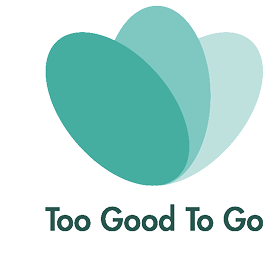
This year NH Hotel Group has continued its alliance with the TooGoodToGo App to combat food wastage in its hotels in Spain. In this way, the Company continues to show its commitment to sustainability by implementing practices that contribute in this case to the utilization of food, reduction in waste and conservation of the environment.
With TooGoodToGo, every day through the app the Company offers surprise packs with unconsumed products from its morning buffet that users of the platform can buy at a reduced price to prevent them from being wasted.
The App has been implemented in 62 hotels in Spain and more will be added as the hotels reopen. The good results of the initiative ensure that it will gradually be extended to more hotels and locations.
This year, 23,558 food packs have been saved, which represents more than 23,558 kg of food that has not been wasted and the equivalent of having saved the emission of 58,895 kg of CO2eq.

Used oil waste for biodiesel
In line with our environmental commitment, all used oil generated in the hotels in Spain is managed through an authorized manager and used as the raw material to manufacture biodiesel, which will then be used as a renewable fuel.
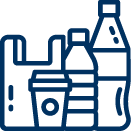
Commitment to reduce single-use plastics
Following the directives of the European Union we have replaced our pens made with oxo- biodegradable material with others made using compostable material (Wheat Straw) and resins. These new pens are in production and will be used in the hotels at the start of 2022. The Company has extended this action to countries outside the European Union (e.g. Latin America).

New Amenities
As part of NH Hotel Group’s commitment to improving the impact of its activity on the environment, and offer our guests the best experience, a new line of amenities has been introduced for all our brands. The new amenities allow us to eliminate all single-use plastics in our room set-up, replacing them with new 100% recycled and recyclable PET, complemented with a new line of bathroom accessories made using biodegradable materials (wheat straw) presented in 100% recycled paper packaging (eliminating chemical dyes or varnishes used in packaging). In addition to this, the new products do not contain parabens, silicones, or alcohol; they have not been tested on animals and are EcoLabel certified.
This project has enabled us to reach the following milestones:
- Switching bottles from 50ml to 320ml: elimination of 14 million bottles of plastic per year, which represents a saving of 45 metric tons of plastic per year, a reduction of 40% in metric tons of plastic and 364 metric tons of CO2 not emitted.
- Elimination of 5 million bars of soap, representing a reduction of 70 metric tons of soap.
- The use of EcoLabel certified products means that all the products included in our amenities that reach the sea do not harm the environment.
- New accessories, both the products and their packaging, are made with sustainable materials, recycled plastic, biodegradable articles, etc.
Although the consumption of raw materials is not identified as a significant aspect for NH Hotel Group in its analysis of environmental risks, European legislation on single-use plastic does have a relevant impact.

CORK2CORK project
This is a project created with the aim of promoting the circular economy and encouraging recycling, reuse and other forms of recovery. This project is a pioneering sustainable initiative in the European hotel sector, which NH Hotel Group has developed together with the leading companies in cork coverings and stoppers, Amorim.
The aim of the initiative is to recover and recycle used cork stoppers from bottles in its hotels to give them a new use, by turning them into material for covering or insulation that can be used in the group’s rooms. This insulating material reduces noise pollution and the needs for artificial climate control in the rooms, thus improving their energy efficiency.
DEVELOPMENT OF MORE SUSTAINABLE PRODUCTS

GREEN HOTEL PROJECT
This project seeks to offer value to customers through sustainable actions, focusing on the innovative attributes that improve brand perception.
As the most noteworthy examples of the project, NH Hotel Group offers EcoFriendly Meeting and Events and Sustainable Mobility services in its hotels.
EcoFriendly meetings
The Group’s hotels strive to involve customers during their events, offering the “Eco-friendly Meetings” service and the carbon footprint calculation and offsetting service for the events and meetings held.
The event’s carbon footprint is calculated following an internal procedure based on the GHG protocol and in the IPCC (Intergovernmental Panel on Climate Change) “Guidelines for preparing national greenhouse gas inventories”. The calculation of the event’s carbon footprint includes transport and the use of meeting rooms, as well as the hotel rooms selected.
Sustainable mobility
During guests’ stays and sightseeing trips, the Company offers mobility services such as carsharing or bicycle hire. Currently there are more than 26 hotels that offer bicycle hire services, as well as charging points for electric cars installed in 48 hotels.
In 2021, an agreement was signed with a partner that will fit all the hotels in Spain and Portugal with charging points in line with current standards (semi-fast charging), at competitive service conditions for the customers of NH Hotel Group. The intention is to extend this model to other countries, where the demand for charging points is growing and an essential requisite.
Alliance with Volvo and ENEL
NH Hotel Group has created an alliance with Volvo and Enel and has installed a charging totem for electric vehicles next to the NH Plaza Santiago hotel in Chile. For greater impact, it is accessible to both guests and the public. This is the first Volvo totem to be installed in Chile. The goal of this project is to place charging points through subsidiaries of Enel in the capital cities where NH Hotel Group is present in the Americas Business Unit area.
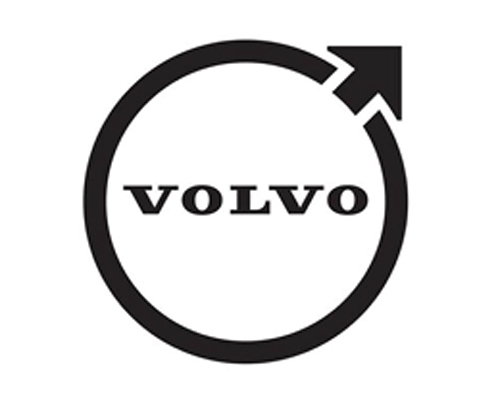

CUSTOMER SATISFACTION WITH SUSTAINABILITY
NH Hotel Group measures customer satisfaction in terms of its sustainability management. This satisfaction is calculated on the basis of the annual number of opinions and the score of these opinions collected by the internal Quality Focus tool.
Top 10 NH Hotel Group hotels rated highest in terms of sustainability by customers

The table above shows the 10 hotels with the highest customer ratings. In order to draw it up, we have used the indicator that relates the number of reviews with the score of the hotel in order to reflect the reality of the customer’s perception.

OTHER NOTABLE PROJECTS
BULK PRODUCTS
NH Hotel Group has launched a project to bulk buy food products such as rice, oil, flour, sugar and salt in all the hotels in Latin America. By buying food in bulk, the production of packaging and the associated waste is reduced, as well as emissions associated to transport of these products and food wastage.
The initiative is being carried out in the hotels
NH Mendoza Cordillera (Argentina), NH Collection Medellín (Colombia), NH Cali (Colombia),
NH Collection Royal Teleport (Colombia),
NH Collection Royal Hacienda (Colombia),
NH Collection Guadalajara Providencia (México), NH Collection Mexico City Reforma (México),
NH Collection Mexico City Centro Histórico (México), NH Collection Aeropuerto T2 Mexico (México) and NH Collection Plaza Santiago (Chile).
BOTTLE CAP COLLECTION FOR SOCIAL PROJECTS
The hotels belonging to the Americas BU have carried out a project to reduce plastic waste and generate resources that are converted into health.
This initiative involves collecting plastic bottle caps for recycling to fund treatments and care for children and young people with cancer. The collection is carried out through containers installed in the hotels and both guests and employees are encouraged to participate. This has been possible thanks to the collaboration with respected foundations such as Banco de Tapitas, Fundación Sanar Niños con Cáncer, Fundación Garrahan and Damas de Café.
SUSTAINABLE FISHING
Although NH Hotel Group does not carry on its activity within any protected natural area, the Company’s applies different measures and initiatives to preserve and restore biodiversity in the environments where it operates.
The Company’s hotels promote sustainable fishing through legal compliance with the consumption of species and responsible procurement of these products.
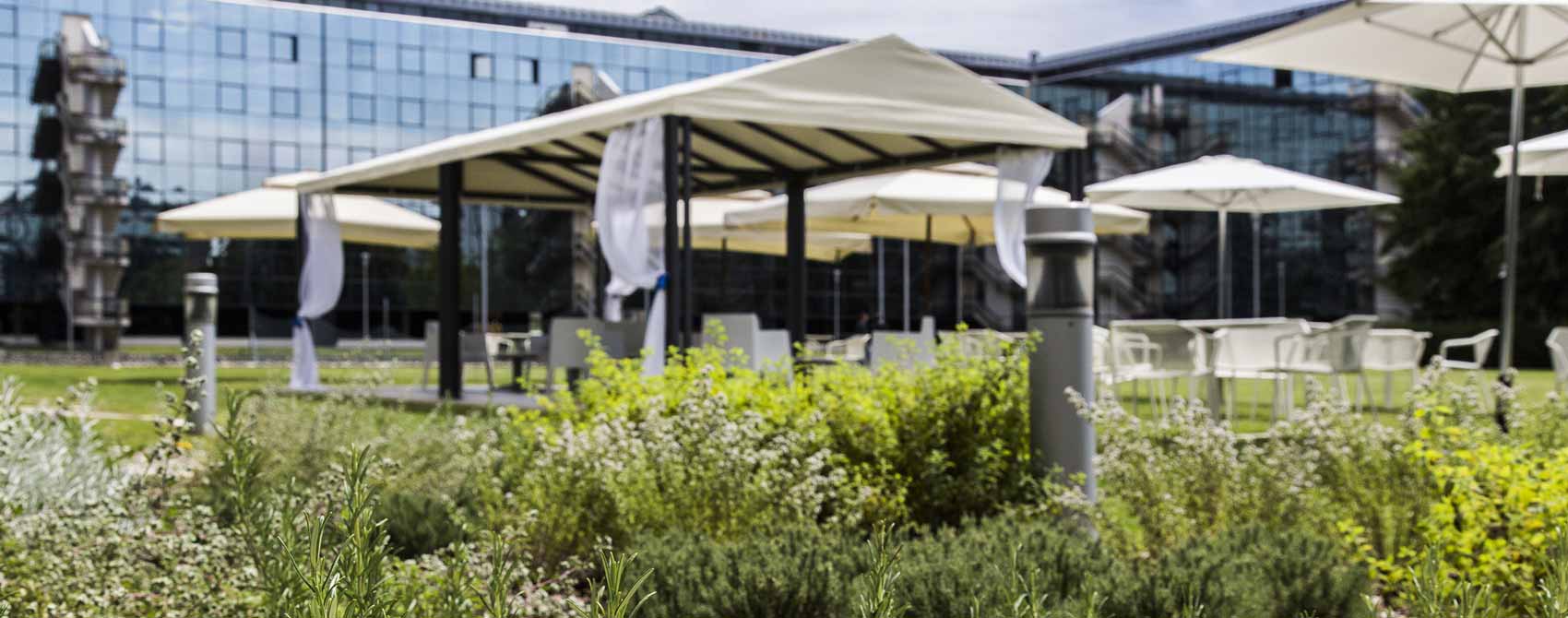
URBAN VEGETABLE GARDENS
Some NH Hotel Group hotels have space to install urban vegetable gardens. Growing in these areas enhances the landscape and gastronomic value of dishes while reducing the environmental impact by reducing the need to transport these products and generates a sense of community among the hotel’s employees.
NH Collection Royal Medellín (Colombia) takes care of an ecological vegetable garden where aromatic herbs such as parsley, thyme, mint, rosemary, peppermint, basil, oregano, etc. are grown. These herbs, which are free from pesticides and have a high nutritional value, are used in the hotel kitchen. This hotel also cares for the green area around its hotel, favoring the habitat of numerous animal species, maintaining the connection passageway between natural areas and favoring the reduction in noise and pollutants. This green area is open to guests to enjoy.
The Hilton Mexico City Airport and NH Collection Royal Hacienda have also added a small vegetable garden to their exterior garden areas where aromatic plans are grown that are also used in the hotel’s kitchen.
In Italy, the NH Collection Piazza Carlina and the NH Milano Congress Center also have vegetable gardens with aromatic plants; and the NH Orio al Serio has another small garden where lettuces and tomatoes are grown.
In turn, the NH Collection Grand Hotel Convento di Amalfi (Italy), on the Amalfi coast, has a garden in which aromatic herbs, vegetables and citrus fruits are grown to be used in the kitchen and in the cosmetics for the hotel’s spa (aloe vera and lavender). Guests can experience this garden through a trail, such as the meditation trail, which consists of visiting the five terraces it currently features: vegetable garden, rose terrace, monks’ walk, botanic terrace and relaxation terrace.
HOTELS POR BEES
Conscious of the limited space in cities for biodiversity, their importance in ecosystems and aware of the critical situation of bees in Europe, the number of hotels that provide a home for bees on their roofs in a way that is safe for guests has increased. These hotels are: NH Wien City (Austria), NH Collection Wien Zentrum (Austria), NH Danube City (Austria), NH Vienna Airport (Austria), NH Berlin Alexanderplatz (Germany), NH Potsdam (Germany) and NH Köln Altstadt (Germany) and NH München Ost Conference Center (Germany).
FRE-RANGE EGGS
NH Hotel Group promotes animal welfare, prioritize the use of free-range eggs. This initiative was implemented in hotels in northern Europe, which currently use free-range eggs in their preparations. In addition, as part of MINT, the Company has joined in the commitment made by Minor Hotels to obtain all the eggs consumed in its establishments from free range hens by the end of 2027.


